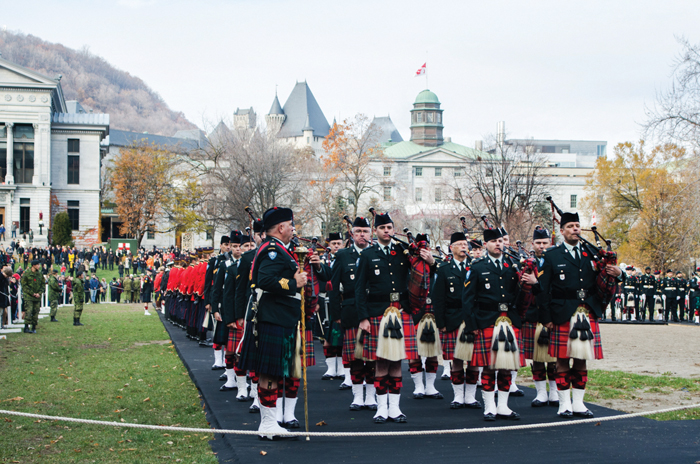The time of year has once again arrived when we see bright scarlet poppies pinned on the breasts of innumerable coats and sweaters. Evoking the frightening clashes of bayonets upon bloody fields, the reverberating shocks and explosions of shells colliding with rain-beaten garrisons, and the agonized screams of trembling men, this ornament sits as a timeless reminder of a turbulent war that shook the world and our nation. And yet, the history of this day—which this little trinket symbolizes—as well as Canada’s broad military history, are often neglected in the bustling conversations across campus.
It is not so surprising that the modern young person is less than enthusiastic about commemorating the legacy of war. When it comes to Remembrance Day, the interest of most Canadians is waning. In a 2006 poll conducted by The Globe and Mail, only 41 per cent of Canadians said they would attend a Remembrance Day ceremony—a nine per cent drop from the preceding year. It also revealed that one in four believed that U.S. General Douglas MacArthur was Canadian; only 31 per cent could identify flying ace Billy Bishop and leading commander Sir Arthur Currie as Canadian military heroes.
A lack of familiarity with Canadian military history generates a respect that is remote, vague, and impersonal. The hazy remembrance of a nameless soldier hardly creates a dignified and realistic tribute to the casualties of several wars. This lack of familiarity converts many apparent acts of Remembrance Day recognition into meaningless, banal customs.
This general disengagement with Remembrance Day is furthered by the fact that some student organizations have attempted to detract from honouring Canada’s military history on this day. For example, Demilitarize McGill’s protests during last year’s Remembrance Day Ceremony at Lower Field indicate that the military tradition has at least to some degree, particularly among youth, been scorned instead of appreciated, in part because of discontent with Canada’s participation in more recent conflicts in Syria and Afghanistan.
Modern student activism, which fosters critical thinking and cultivates political discussion, should not be discouraged. However, a greater understanding of the Canadian military history must be achieved before it can be dismissed in its entirety. Canadians must take Remembrance Day as an opportunity to remember other prominent pieces of Canadian military history. Canada also made valuable contributions in the Second World War and the Korean War, which are worthy of recognition and appreciation. If Canadians realized some of the Canadian military’s considerable efforts to prevent human rights abuses and defend the rights of vulnerable nations from aggression, they might be more hesitant to dismiss or scorn its history.
The problems with student observance of Remembrance Day are unlikely to improve this year: Montreal’s annual Remembrance Day ceremony is no longer being held on McGill’s downtown campus due to construction on Sherbrooke Street. Yet in the absence of a formal ceremony, students should still consciously and honestly examine why Canada embraces Remembrance Day. One ought to know the historical and contemporary legacy of our nation’s military before one can celebrate or dismiss it.








